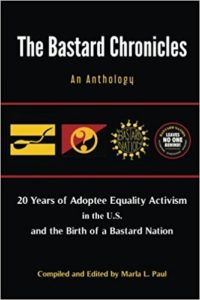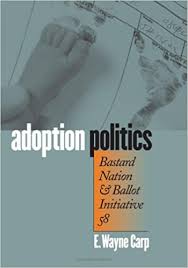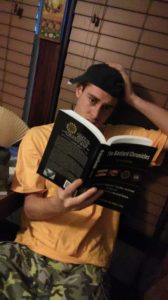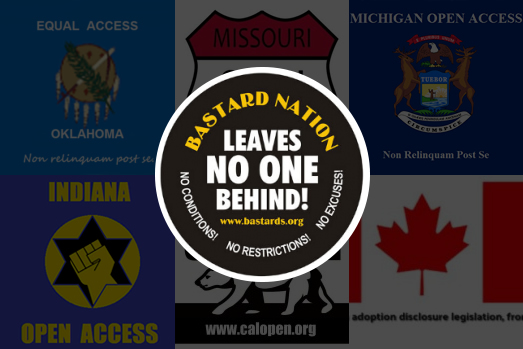The Bastard Chronicles: 20 Years of Adoptee Equality Activism in the US and the Birth of Bastard Nation
Compiled and edited by Marla L. Paul
 Bastard Nation is proud to announce the publication of The Bastard Chronicles: 20 Years of Adoptee Equality Activism in the U.S.and the Birth of a Bastard Nation. Compiled and edited by Marla Paul, it is a primer for adoptee equality. It features a diverse collection of Bastard theory, and practice, Bastard and Bastard Nation history, legislative and political action, personal stories, art, and literature. It is the public face of Class Bastard written by Bastard Nationals and those we have influenced. Available in print at the Bastard Boutique and Amazon and on Kindle.
Bastard Nation is proud to announce the publication of The Bastard Chronicles: 20 Years of Adoptee Equality Activism in the U.S.and the Birth of a Bastard Nation. Compiled and edited by Marla Paul, it is a primer for adoptee equality. It features a diverse collection of Bastard theory, and practice, Bastard and Bastard Nation history, legislative and political action, personal stories, art, and literature. It is the public face of Class Bastard written by Bastard Nationals and those we have influenced. Available in print at the Bastard Boutique and Amazon and on Kindle.
Adoption Politics: Bastard Nation and Ballot Initiative 58
By E. Wayne Carp
 The passage of Measure 58 in Oregon in 1998 was a milestone in adoption reform. For the first time in U.S. history, a grassroots initiative restored the legal right of adopted adults to request and receive their original birth certificates. Within a day after the law went into effect, nearly 2,400 adoptees had applied for these previously sealed records, elevating their right to know over a birth mother’s right to privacy.
The passage of Measure 58 in Oregon in 1998 was a milestone in adoption reform. For the first time in U.S. history, a grassroots initiative restored the legal right of adopted adults to request and receive their original birth certificates. Within a day after the law went into effect, nearly 2,400 adoptees had applied for these previously sealed records, elevating their right to know over a birth mother’s right to privacy.
E. Wayne Carp, a nationally respected authority on adoption history, now reveals the efforts of the radical adoptee rights organization Bastard Nation to pass this milestone initiative. He has written an intimate history of a passionately proposed and opposed initiative that has the potential to revolutionize the adoption reform movement nationwide.
Carp follows the campaign from its inception through the hard-fought signature drives of proponents Helen Hill and Shea Grimm to the electoral campaign and ensuing court battles. The opposition was formidable: government officials, adoption agencies, news media, the ACLU, religious organizations, and ad-hoc citizen political groups. Using correspondence and his own candid interviews with all the key players, Carp shows how both sides mobilized their constituencies and formed their strategies. In describing challenges to Measure 58’s constitutionality, Carp reveals legal arguments that were never publicized by the Oregon media and remained unknown to the American public until now—issues centering on privacy rights that are crucial to understanding both sides of the controversy and the hazards of initiative politics.
As Carp shows, Measure 58 was important because it framed the issue of adoption reform in terms of civil rights and equal protection of the law rather than in terms of psychological needs or medical necessity. The resulting law now gives adult adoptees access to birth certificates but it also allows birth mothers to indicate whether or not they wish to be contacted. Carp not only chronicles a milestone initiative and a model piece of legislation for other states to emulate, he also proposes a sensible way to cut the Gordian Knot that bedevils adoption reform today.
This is an archive of the original Bastard Nation website created in 1996. It includes archives of BN materials up until 2007, much of which is no longer available on the new BN website. You never know what you will find there.
Books for the Well-Read Bastard

Activism
- Grassroots Media Relations: A Short Introduction to Media Relation Strategies for Activist Groups, Connections (online only)
- Queer in America by Michaelangelo Signorile
- Rules for Radicals by Saul Alinsky
- NEW Speaking Out of Place: Gettting Our Political Voices Back by David Palumbo-Liu
- The Activist’s Handbook by Randy Shaw
- The Art of War by Sun Tzu (best translations from Amazon)
Autobiography, Biography, Memoir
-
- Adoption Not an Option: A Metis Woman Torn from Her Family and Her 40 Year Battle to Find Them Again by Eugenea Couture
- An Adopted Woman by Katrina Maxtone-Graham
- At Home: A Memoir of Growing Up in an Orphanage by Richard McKenzie
- NEW Bastard: A Memoir by Mary Anna King
- Beat Bastard: An Adoptee’s Portfolio by Robert Hyatt, Jr
- Being Adopted by Maxine Rosenberg
- Birthmark by Lorraine Dusky
- Coming Apart Together: Fragments from an Adoption by Emily Hipchen
- Fugitive Visions: An Adoptee’s Return to Korea by Jane Jeong Trenka
- Fumbling Toward Divinity: The Adoption Scriptures by Craig Hickman
- Ithaka: A Daughter’s Memoir of Being Found by Sarah Saffian
- Jean Paton and the Struggle to Reform American Adoption by E Wayne Carp
- Mommie Dearest by Christina Crawford
- My Dark Places by James Ellroy (not about adoption but relevant)
- My Secret Mother Lorna Moon by Richard deMille
- One Small Sacrifice by Trace DeMeyer
- Oranges Are Not the Only Fruit by Jeanette Winterson
- Outer Search, Inner Journey: An Orphan and Adoptee’s Quest by Peter Dodds
- Pieces of My Heart: A Free Spirited Gypsy’s Journey by Katy O Ishee
- Red Dust Road by Jackie Kay
- Second Choice: Growing Up Adopted by Robert Anderson
- The Brightness of Stars: Stories of Adults Came Through the British Care System by Lisa Cherry
- NEW The Guild of the Infant Savior: An Adopted Child’s Memory Book by Megan Culhane Galbraith
- The Language of Blood by Jane Jeong Trenka
- The Last Invisible Continent: Essays on Adoption and Identity by Michael Allen Potter
- The Light in the Window by June Goulding
- The Lives and Loves of Daisy and Violet Hilton: A True Story of Conjoined Twins by Dean Jensen
- The Other Mother by Carol Schaefer
- The Search for Anna Fisher by Florence Fisher
- The Search for Mother Missing: A Peek Inside International Adoption by Janine Vance
- Why Be Happy When You Can Be Normal by Jeanette Winterson
- You Don’t Know How Lucky You Are: An Adoptee’s Journey Through The American Adoption Experience by Rudy Owens
Non-Fiction
-
- Adopted Territory: Korean Adoption and the Politics of Belonging by Eleana J Kim
- Adoption in America: Historical Perspectives, ed. E. Wayne Carp
- Adoption, Identity, and Kinship: the Debate Over Sealed Birth Records by Katarina Wagar
- Adoption Matters: Philosophical and Feminist Essays, ed Sally Haslanger and Charlotte Witt
- NEW American Baby: A Mother, a Child, and the Shadow History of Adoption, Gabrielle Glaser
- And Sin No More: Social Policy and Unwed Mothers in Cleveland, 1855-1990 by Marian J. Morton
- Babies Without Borders: Adoption, Migration Across the Americas by Karen Dubinsky
- Banished Babies: The Secret History of Ireland’s Baby Export Business by Mile Milotte
- Black Anthology: Adopted Adults Claim Their Space ed, by Diane Rene Christia
- Being Adopted: The Lifelong Search for Self by David M Brodzinsky and Marshall D. Schecter
- Beggars and Choosers: How Politics of Choice Shapes Adoption, Abortion, and Welfare in the United States by Rickie Solinger
- Blood Ties and Fictive Ties: Adoption and Family Life in Early Modern France by Kristin Elizabeth Gage
- Delinquent Daughters: Protecting and Policing Adolescent Female Sexuality in the United States, 1885-1920 by Mary E. Odem
- Endangered Children: Dependency, Neglect and Abuse in American History by LeRoy Ashby
- Fallen Women, Problem Girls: Unmarried Mothers and the Professionalization of Social Work, 1890-1945 by Regina G Kunzel
- Family Matters: Secrecy and Disclosure in the History of Adoption by E Wayne Carp</li
- Far from the Reservation: The Transracial Adoption of American Indian Children by David Fanshal
- Flip the Script: Adult Adoptee Anthology ed Diane Rene Christian
- NEW Giving Up Baby: Safe Haven Laws, Motherhood, and Reproductive Justice by Laury Oaks
- Growing in the Dark: Adoption Secrecy and its Consequences by Janine M Baer
- How All Politics Became Reproductive Politics: From Welfare Reform to Foreclosure to Trump (Reproductive Justice: A New Vision for the 21st Century) by Laura Briggs
- Imagining Adoption: Essays on Literature and Culture, ed Marianne Novy
- In the Shadow of the Poorhouse: A Social History of Welfare in America by Michael B. Katz
- International Adoption: Global Inequalities and the Circulation of Children by Diana Marre and Laura Briggs
- Ireland’s Magdalen Laundries and the Nation’s Architecture of Containment by James M Smith
- Journey of the Adopted Self: A Quest for Wholeness by BJ Lifton
- Legislative Committee Hearings on Adoptee Rights in New York State in 1976 and 2014 by Toff Phillipo
- Like Our Very Own; Adoption and the Changing Culture of Motherhood, 1851-1950 by Julie Berebitsky
- Living Room Lectures: The Fifties Family in Film and Television by Nina C Leibman
- Lost and Found: The Adoption Experience by BJ Lifton
- Love Leaves No Regrets: An Insightful View of Displaced Children Through the Eyes of a Former Foster Child by Robert Cowell
- Mothers of Misery: Child Abandonment in Russia by David L Ransel
- National Council for Adoption Factbook III, ed William L Pierce and Conaught Marshner. (Bill Pierce’s last hurrah! And no, it wasn’t published by The Onion.
- Origins of the Magdalene Laundries by Rebecca Lea McCarthy
- Outsiders Within: Writing on Transracial Adoption ed by Jane Jeong Trenka, Sun Yung Shin, Julia Chinyere Oparah
- Perpetual Child: Adult Adoptees Anthology: Dismantling the Stereotype by Diane Rene Christian
- Pregnancy and Power: A Short History of Reproductive Politics in America by Rickie Solinger
- Reading Adoption: Family and Difference in Fiction and Drama by Marianne Novy
- Reframing Transracial Adoption: Adopted Koreans, White Parents, and the Politics of Kinship by Kristi Brian
- Reproducing Empire: Race, Sex, Science and US Imperialism in Puerto Rico by Laura Briggs
- Sacrificed for Honor: Infant Abandonment and the Politics of Reproductive Control by David Kertzer
- Sealed and Secret Kinship: The Culture of Policies and Practices in American Adoption by Judith S Modell
- Searching for Life: the Grandmothers of the Plaza de Mayo and the Disappeared Childen of Argentina by Rita Arditti
- Shattered Bonds: The Color of Child Welfare by Dorothy Roberts
- Somebody’s Children: The Politics of Transracial and Transnational Adoption by Laura Briggs
- The Adopted Break Silence by Jean Paton (out of print)
- The Adoption Mystique by Joanne Wolf Small
- The Baby Thief: The Untold Story of Georgia Tann, the Baby Seller Who Corrupted Adoption by Barbara Bisantz Raymond
- The Child Catchers: Rescue, Trafficking and the New Gospel of Adoption by Kathryn Joyce
- The Dark Side of Adoption by Mirah Riben
- The Declassified Adoptee: Essays of an Adoption Activist by Amanda H L Woolston-Transue
- The Ghost at Heart’s Edge: Stories and Poems on Adoption ed by Susan Ito and Tina Cervin
- The Girls Who Went Away: The Hidden History of Women Who Surrendered Children for Adoption in the Decades Before Roe v Wade by Ann Fessler
- The Great Orphan Abduction by Linda Gordon
- The Last Invisible Continent: Essays on Adoption and Identity by Michael Allen Potter
- The Kindness of Strangers: The Abandonment of Childen in Western Europe from Late Antiquity to the Renaissance by John Boswell
-
The Search for Mother Missing: A Peek Inside International Adoption by Janine Vance
- The Way We Never Were: America Families and the Nostalgia Trap by Stephanie Coonz.
- To Save the Children of Korea: The Cold War Origins of International Adoption by Arissa Oh
- Transnational Adoption: A Cultural Economy of Race, Gender, and Kinship by Sara K Dorow
- Two Worlds: Lost Children of the Indian Adoption Projects by Patricia Busbee and Trace A DeMeyer
- Wake Up Little Susie: Single Pregnancy and Race before Roe v Wade by Rickie Solinger
- Where are My Birthparents: A Guide for Teenage Adoptees by Susan Fischer and Karen Gravelle
- Where Courage is Like a Wild Horse: The World of an Indian Orphanage by Sharon Skolnick and Manny Skolnick
Fiction
- Bleak House by Charles Dickens
- David Copperfield by Charles Dickens*
- Daniel Deronda by George Eliot*
- Jane Eyre by Charlotte Bronte*
- Oliver Twist by Charles Dickens*
- Teacups and Tiger Claws by Timothy Patrick
- The Bad Seed by William March (novel not play)
- The Bean Trees by Barbara Kinsolver
- The Book Thief by Markus Zusak
- The Cider House Rules by John Irving
- The Collected Plays of Edward Albee, v 1,by Edward Albee
- The Collected Plays of Edward Albee, v 2 by Edward Albee
- The Mother Hunt (Nero Wolf #18) by Rex Stout
- This History of Tom Jones A Foundling by Henry Fielding*
- When I Found You by Catherine Ryan Hyde
- Wuthering Heights by Emily Bronte*
- You Remind Me of Me by Dan Chaon
* Classics found in many editions
Updated March 8, 2022





Please see the book on Kindle, “Be Longing” by S J Wimmer
https://www.amazon.de/SJ-Wimmer/e/B01MXR94TO?ref_=dbs_p_ebk_r00_abau_000000
The founder of AdoptedLife
The Non-Fiction section lists the author of “The Way We Were: American Families and the Nostalgia Trap” as Stephanie Koonz. The correct spelling of the author’s surname is Coontz.
https://www.stephaniecoontz.com/books
Fixed! Thanks. My bad, especially since I know better!
Great resource. Thank you. Also, The Primal Wound: Understanding the Adopted Child by Nancy Verrier.
I wish there were more books, memoirs, et cetera about the general issue of military presence in other countries and its negative historical consequences (like my place of birth in the Philippines), that contribute to many impregnated young females and abandoned children. I see plenty more media with regard to this from Korea.
Why this isn’t discussed or why there is so little literature & media reporting on this is a mystery to me; what with all the unsafe abortions, orphans, child & sex trafficking, sex tourism, et cetera that’s tied up in such wanton licentiousness. There doesn’t seem to be any accountability, be it ethically or economically, on the parts of occupying countries whose presence have left thousands upon thousands of distraught lives in their wake.
Go figure…